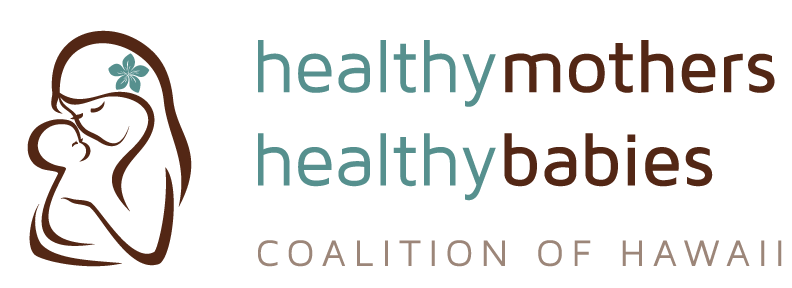Alcohol, Smoking & Substance Use During Pregnancy
Healthy Mothers, Healthy Babies Coalition of Hawaii supports programs to educate women on the dangers of drinking alcohol, smoking, and substance abuse during pregnancy.
Alcohol and Pregnancy
If you’re pregnant and wondering if it might be okay to have an an occasional glass of wine or other alcoholic beverage, the answer is a resounding NO. Even one alcoholic beverage during pregnancy could harm your baby. Here are the facts:
- There is no known safe amount of alcohol to drink while pregnant.
- There is no safe time during pregnancy to drink.
- There is no safe kind of alcohol to drink during pregnancy.
The dangers of alcohol use during pregnancy led the Institute of Medicine (1996) to state, “Of all the substances of abuse (including cocaine, heroin, and marijuana) alcohol produces, by far, the most serious neurobehavioral effects on the fetus.”
Effects of Drinking Alcohol While Pregnant
Drinking alcohol while pregnant—even a small amount—can produce severe effects in the unborn baby known as Fetal Alcohol Spectrum Disorders (FASDs). FASDs are a group of conditions that can occur in a person whose mother drank alcohol during pregnancy, including physical problems and problems with behavior and learning.
A specific type of FASD known as Fetal Alcohol Syndrome (FAS) is the leading cause of preventable mental retardation in the United States. The only way to prevent FAS is to not drink any amount of alcohol while you are pregnant. Other lifelong consequences to your baby may include brain damage, heart, kidney, liver, vision and hearing problems, slow growth, and birth defects such as deformed or stunted bones. In fact, those affected by FASD often have problems at school and work, and with personal relationships.
Protecting Your Baby from FASD
Each year in the U.S., as many as 40,000 babies are born with FASD. The cost of caring for one child with FASD is $1.4 million over the child’s lifetime. While there is no cure for FASD, it is 100% preventable if you don’t drink alcohol while you are pregnant.
If you are pregnant and drinking alcohol, you can still help your unborn baby if you stop drinking now. The more alcohol you drink while you are pregnant, the more likely you baby is to be born with FASD.
If you need help to stop drinking, talk to your health care provider. To find a substance abuse treatment facility in your area, visit our Resource Directory or call our MothersCare Line at (808) 951-6660 or (888) 951-6661.
Smoking and Pregnancy
It’s well established that tobacco use causes cancer, heart disease and lung disease. Smoking during pregnancy also can cause serious harm to your baby, including birth defects, premature delivery, and even infant death.
If you smoke during pregnancy, your baby is exposed to dangerous chemicals like nicotine, carbon monoxide and tar. These chemicals pass through the placenta and umbilical cord and enter your baby’s bloodstream, reducing the amount of oxygen your baby receives. This can affect your baby’s growth and development, and may cause damage to the heart, lungs, and brain.
The dangerous effects of smoking don’t stop there. Babies of mothers who smoke during pregnancy are more likely to be born with certain birth defects, like a cleft lip or cleft palate. They are also more likely to be born prematurely and with a low birth weight, increasing the risk of other serious health problems including lifelong disabilities, and in some cases, death. According to the CDC, women who smoke during pregnancy are more likely than other women to have a miscarriage, and the infants of mothers who smoke during or after pregnancy are at risk for SIDS (Sudden Infant Death Syndrome).
E-Cigarettes
If you’re wondering whether electronic cigarettes (also known as e-cigarettes) are safe to smoke during pregnancy, the answer is no. The liquid contained in e-cigarettes typically contains nicotine, flavorings and other chemicals. The CDC states that e-cigarettes and other devices containing nicotine are not safe to use during pregnancy since nicotine can cause damage to the baby’s heart and lungs. Additionally, some of the chemicals used in e-cigarettes may be harmful to your developing baby.
Benefits of Quitting
It’s best to quit smoking before you get pregnant, but quitting anytime during pregnancy can have a positive effect on your baby’s health and life.
When you quit smoking:
- Your baby will get more oxygen, even after just one day of not smoking.
- There is less risk that your baby will be born too early.
- There is a better chance that your baby will come home from the hospital with you.
- You will be less likely to develop heart disease, stroke, lung cancer, chronic lung disease, and other smoke-related diseases.
- You will have more energy and breathe more easily.
- Your clothes, hair, and home will smell better.
- Your food will taste better.
- You will have more money that you can spend on other things.
- You will feel good about what you have done for yourself and your baby.
Source: Maternal and Infant Health- Tobacco Use and Pregnancy (CDC)
Tips to Help You Quit Smoking
- Write down your reasons for quitting. Look at the list when you are tempted to smoke.
- Choose a “quit day.” On that day, throw away all your cigarettes or cigars, lighters and ashtrays.
- Drink plenty of water.
- Use a stress ball to keep your hands busy.
- Keep yourself occupied. Try going for a walk or doing chores to keep your mind off of cravings.
- Snack on some raw veggies or chew some sugarless gum to ease the need to have something in your mouth.
- Stay away from places, activities or people that make you feel like smoking.
- Ask your partner or a friend to help you quit. Call that person when you feel like smoking.
- Aids such as patches, gum, nasal spray and medications can help suppress the urge to smoke.
- Don’t get discouraged if you don’t quit completely right away. Keep trying. If you can’t quit, cut back as much as you can.
- Ask your employer to see what services are offered or covered by insurance.
- Learn about smoking cessation programs in your community or from your employer. You can get more information from your health care provider, hospital or health department.
Source: Alcohol and Drugs- Smoking During Pregnancy (March of Dimes)
For More Information
Learn More



